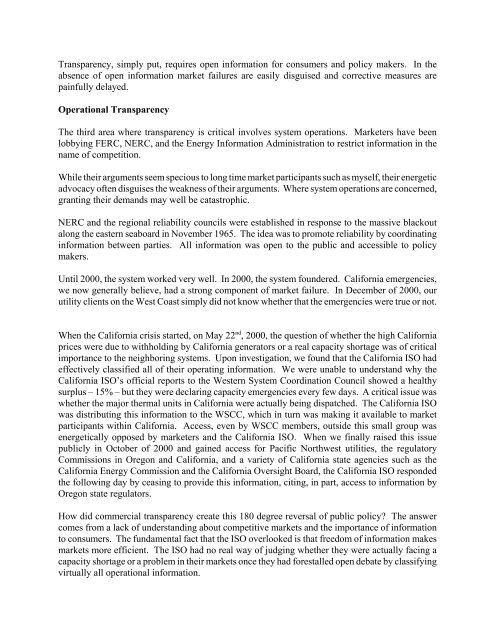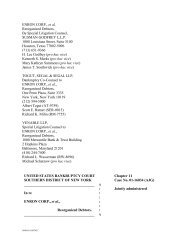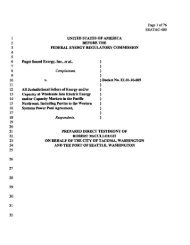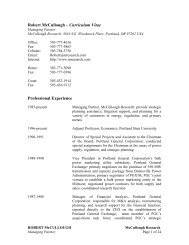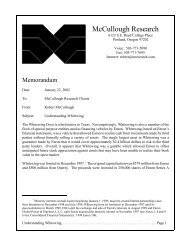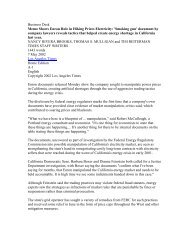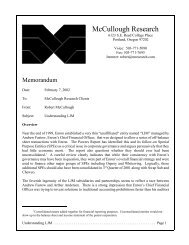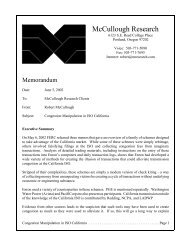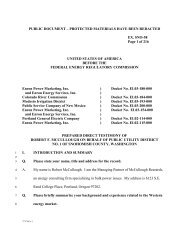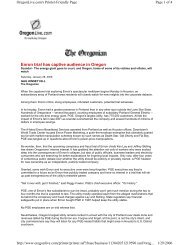Testimony of Robert McCullough before the U.S. Senate Committee ...
Testimony of Robert McCullough before the U.S. Senate Committee ...
Testimony of Robert McCullough before the U.S. Senate Committee ...
You also want an ePaper? Increase the reach of your titles
YUMPU automatically turns print PDFs into web optimized ePapers that Google loves.
Transparency, simply put, requires open information for consumers and policy makers. In <strong>the</strong><br />
absence <strong>of</strong> open information market failures are easily disguised and corrective measures are<br />
painfully delayed.<br />
Operational Transparency<br />
The third area where transparency is critical involves system operations. Marketers have been<br />
lobbying FERC, NERC, and <strong>the</strong> Energy Information Administration to restrict information in <strong>the</strong><br />
name <strong>of</strong> competition.<br />
While <strong>the</strong>ir arguments seem specious to long time market participants such as myself, <strong>the</strong>ir energetic<br />
advocacy <strong>of</strong>ten disguises <strong>the</strong> weakness <strong>of</strong> <strong>the</strong>ir arguments. Where system operations are concerned,<br />
granting <strong>the</strong>ir demands may well be catastrophic.<br />
NERC and <strong>the</strong> regional reliability councils were established in response to <strong>the</strong> massive blackout<br />
along <strong>the</strong> eastern seaboard in November 1965. The idea was to promote reliability by coordinating<br />
information between parties. All information was open to <strong>the</strong> public and accessible to policy<br />
makers.<br />
Until 2000, <strong>the</strong> system worked very well. In 2000, <strong>the</strong> system foundered. California emergencies,<br />
we now generally believe, had a strong component <strong>of</strong> market failure. In December <strong>of</strong> 2000, our<br />
utility clients on <strong>the</strong> West Coast simply did not know whe<strong>the</strong>r that <strong>the</strong> emergencies were true or not.<br />
When <strong>the</strong> California crisis started, on May 22 nd , 2000, <strong>the</strong> question <strong>of</strong> whe<strong>the</strong>r <strong>the</strong> high California<br />
prices were due to withholding by California generators or a real capacity shortage was <strong>of</strong> critical<br />
importance to <strong>the</strong> neighboring systems. Upon investigation, we found that <strong>the</strong> California ISO had<br />
effectively classified all <strong>of</strong> <strong>the</strong>ir operating information. We were unable to understand why <strong>the</strong><br />
California ISO’s <strong>of</strong>ficial reports to <strong>the</strong> Western System Coordination Council showed a healthy<br />
surplus – 15% – but <strong>the</strong>y were declaring capacity emergencies every few days. A critical issue was<br />
whe<strong>the</strong>r <strong>the</strong> major <strong>the</strong>rmal units in California were actually being dispatched. The California ISO<br />
was distributing this information to <strong>the</strong> WSCC, which in turn was making it available to market<br />
participants within California. Access, even by WSCC members, outside this small group was<br />
energetically opposed by marketers and <strong>the</strong> California ISO. When we finally raised this issue<br />
publicly in October <strong>of</strong> 2000 and gained access for Pacific Northwest utilities, <strong>the</strong> regulatory<br />
Commissions in Oregon and California, and a variety <strong>of</strong> California state agencies such as <strong>the</strong><br />
California Energy Commission and <strong>the</strong> California Oversight Board, <strong>the</strong> California ISO responded<br />
<strong>the</strong> following day by ceasing to provide this information, citing, in part, access to information by<br />
Oregon state regulators.<br />
How did commercial transparency create this 180 degree reversal <strong>of</strong> public policy? The answer<br />
comes from a lack <strong>of</strong> understanding about competitive markets and <strong>the</strong> importance <strong>of</strong> information<br />
to consumers. The fundamental fact that <strong>the</strong> ISO overlooked is that freedom <strong>of</strong> information makes<br />
markets more efficient. The ISO had no real way <strong>of</strong> judging whe<strong>the</strong>r <strong>the</strong>y were actually facing a<br />
capacity shortage or a problem in <strong>the</strong>ir markets once <strong>the</strong>y had forestalled open debate by classifying<br />
virtually all operational information.


